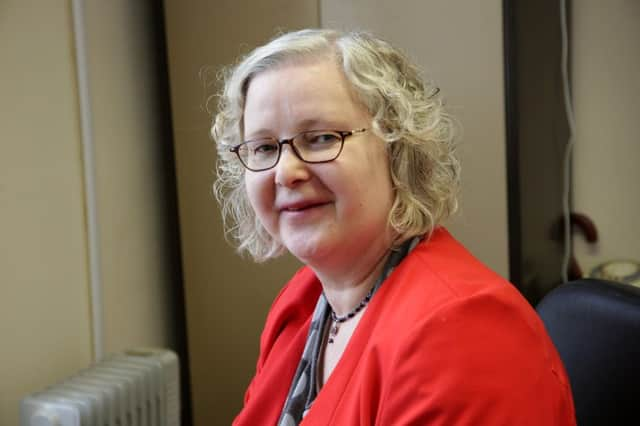Take note, Maureen's a very special lawyer


So what is it that connects such an eclectic bunch?
All three were, are (or nearly was in the case of Dali) notaries.
Pop superstar J Lo is a certifiednotary in Washington, William Shakespeare, if historians have it right, was a notary in Warwickshire and it was possibly this experience he drew on when he wrote The Merchant of Venice.
Advertisement
Hide AdAdvertisement
Hide AdThere are more than 800 notaries or notary publics to give them their exact title across Britain, though none as famous or flamboyant as the ones above.
The majority in the UK are ordinary members of the legal profession who fit their specialist work in with their other duties.
We have two here in Halifax – one of whom is Maureen Cawthorn, managing director of Wilkinson Woodward Bearders Solicitors. The other is David Lee who continues his notary work after retiring from Finn Gledhill solicitors where he was senior partner.
The ordinary man in the street generally might not know what a notary public does. However, if like thousands of people you are thinking of buying a property abroad (or even selling one), likely as not you will need their services.
Advertisement
Hide AdAdvertisement
Hide Ad“My role is to make legal documents work here (in the UK) that will then work abroad”, says Maureen, married and mother of a grown up son, who joined the Halifax, Huddersfield and Brighouse-based law firm in 1992. “We help people to get married abroad, do business abroad, buy and sell property abroad and provide the documentation for people to administer the estates of those who have died abroad. I have my own seal and it is recognised around the world whereas the signature of a solicitor isn’t always.”
Maureen joined the firm specialising in commercial litigation, insolvency and employment disputes, but as the company grew she found herself increasingly in a management role.
“The bulk of my work is management though I still keep my hand in with fee earning work. But the one thing I can do all the time because it fits in is the notary public work.”
Notaries are the oldest branch of the legal profession and existed pre-Reformation. Originally they were appointees of Popes but after the Reformation, Henry VIII appointed his own notaries through the Archbishop of Canterbury.
Advertisement
Hide AdAdvertisement
Hide Ad“From that day to this notaries are appointed by the Archbishop of Canterbury”.
Maureen’s firm historically had a notary on its staff – she thinks this could have been because of Halifax’s important position as a centre of textile export and industry – Crossley Carpets for instance.
Her qualification course administered by Cambridge University lasted two years (it is run by UCL now).
“I had to learn aspects of Roman law because of where it started historically which as you can imagine is really useful in Halifax – we’re forever having to repel Centurions! There were also elements of International law, public law and notarial practice”, she says.
Advertisement
Hide AdAdvertisement
Hide AdThe final challenge was to swear an oath of allegiance in front of a vicar – which wasn’t as simply as she had imagined.
“One assumes the Archbishop doesn’t want would-be notaries arriving at Lambeth Palace all the time. So my instructions were to find a local vicar. I approached the vicar of St Jude’s who admitted he’d never come across it before.”
After that Maureen received her seal of appointment which proudly hangs in her office – an historic document that hasn’t changed since the Reformation. She also received her unique seal which identifies her position as a notary public.
She explains that the process of drawing documents is one that cannot be hurried. Once completed, the document(s) go to the Foreign and Commonwealth Office for approval and in some cases they must also be sent to foreign embassies, depending on which country a client is dealing with, for their verification too.
Advertisement
Hide AdAdvertisement
Hide AdThe finished document is produced on high quality paper bound in ribbon with the notary’s signature supported by his or her individual seal.
It is work that at times has caused surprises, but work which she enjoys immensely.
“It is different from other types of law. Dispute and resolution can take time, but this has a beginning, a middle and an end. You are getting something done and achieving something for somebody that they would not have been able to do without your involvement”.
Some years ago Maureen remembers being contacted one Christmas by a young man who was due to get married in Brazil and needed the relevant papers. He was cutting it fine, but while working quickly even Maureen could not have foreseen the problems that lay ahead.
Advertisement
Hide AdAdvertisement
Hide AdWhen papers were sent to the Brazilian Embassy nobody said that a new ambassador had been appointed and in the interim, the bridegroom-to-be’s documents could not be dealt with, placing his wedding in jeopardy.
“He did make it by the skin of his teeth, though I never got an invite, more’s the pity,” she says.
Notaries must keep a copy of all the documents they produce, though some now scan them online. In fact there is a growing pressure to take the work online which seems completely at odds with the unique historic position of notarial work.
On a visit to Lambeth Palace Maureen recalls being shown several historical notary documents dating back to 1300s which she found particularly illuminating.
“There is a modern school of thought that says it is all terribly old fashioned but paper (very good quality paper), ink pens (and the Royal Mail) is still where it’s at.”